#Amphiaraus
Text

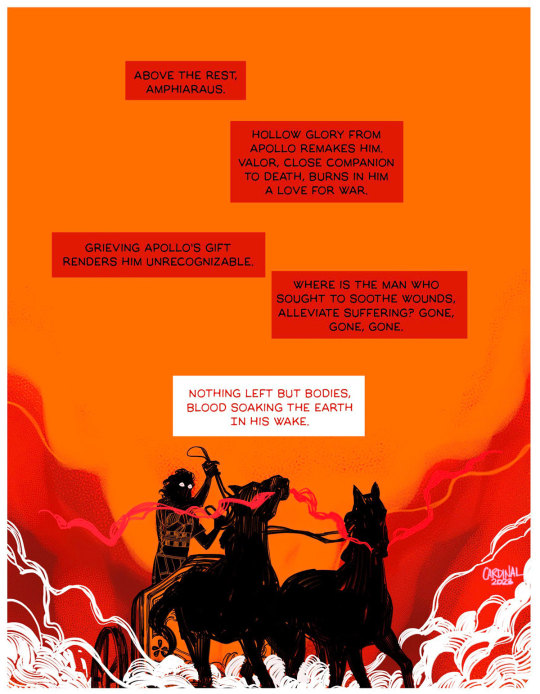



WHAT DOOM FOR YOU?
back again with my Please Read The Thebaid Agenda! I adapted the ending of Book VII into a comic because oh boy. thoughts thoughts thoughts.
There is a horror in having yourself altered to such a degree where you are unrecognizable in your own self, to know that it is happening, to know that you should be dead and yet you are not. You have already seen the moment of your death!!!! (Stat. Theb. 3.537 – 47) There's a horror in knowing, and in it being treated as an act of love when it's really more like a violation. Amphiaraus is spared Creon's decree, but by falling into the underworld, it makes things worse on a cosmic scale.
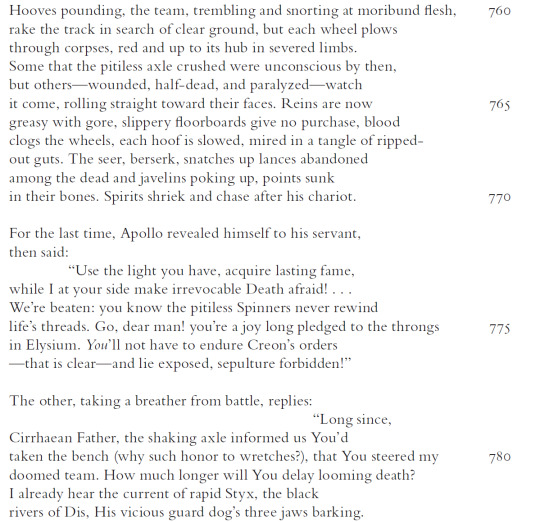
Statius' Thebaid Book VII, trans. Jane Wilson Joyce

Statius and Virgil: The Thebaid and the Reinterpretation of the Aeneid, Randall T. Ganiban

Statius' Thebaid and the Poetics of Civil War, Charles McNelis
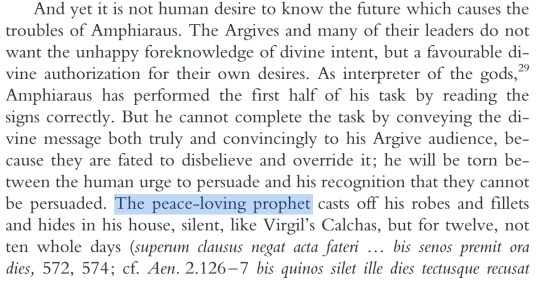

The Perils of Prophecy: Statius' Amphiaraus and His Literary Antecedents, E. Fantham
society6 | ko-fi | twitter (pillowfort, cohost) | deviantart
#the thebaid#komiks tag#long post#amphiaraus#wheezing i actually started this last year; i only JUST got around to finally finishing/formatting it all#anyway please read the thebaid it's so good#theres something about apollo perpetuating cycles of violence as a catalyst for it u know.#in book one they recount how apollo's rape of a king's daughter is what set in motion the events that led to current rituals#and then with amphiaraus the collapsing of borders between the 3 realms dragging the cosmic in to the war#the war that mars himself looked away from in disgust!!!!#it’s all greek to me
1K notes
·
View notes
Text

heard some guys were gonna go conquer thebes. i'm sure they'll be fine
#hi i've been doodling characters as i read#here's 43% of the seven against thebes#also i'm very set on the idea that tydeus' eartip got sliced off in the ambush at the sphinx rock#the thebaid#theban cycle#seven against thebes#parthenopaeus#tydeus#amphiaraus#tagamemnon#slettart
45 notes
·
View notes
Text

Marble prohedria (honorary seats) at the ancient theatre of the Amphiareion of Oropos, Attica, Greece.
#marble#prohedria#honorary#seats#chairs#thrones#ancient greece#ancient greek#theatre#europe#european#amphiareion of oropos#attica#art#history#greece#sanctuary#temple#antiquity#amphiaraus#amphiaraos#honour#honorific
455 notes
·
View notes
Text

her
#greek mythology#tagamemnon#eriphyle#i lvoe her sm#amphiaraos#amphiaraus#he doenst matter#he would be liek “i HATE my wife” and give her all the gold n jewelry in argos#my art
10 notes
·
View notes
Text
Summary: Amphiaraos attempts to resist the forces of the Underworld whipped up by an angry Oidipous every step of the way, but as the ill omens surrounding their attack on Thebes grows, he's left with little option but to be swept along.
And in the end he will be joining the very same forces of the Underworld, in a slightly unorthodox manner.
5 notes
·
View notes
Text

house of Amphiaraos
LIMC Monument #45170
Inscriptions: Above Amphiaraus: Αμφι(α)ρα[ο]ς. Above Eriphyle: [Ερι]φ̣υλη. To right of the boy: Αλκμεων. Above the girl: Δημώ̣.
#Alkmaion#Alcmaeon#Amphiaraus#Amphiaraos#Eriphyle#Demonassa#tagamemnon#Since this pottery has baby alcmaeon and girl demonassa#I think Demonassa would be the older sibling#and first child maybe#ofc there would be other sources describing demonassa younger#but i like this older-demonassa version
4 notes
·
View notes
Text
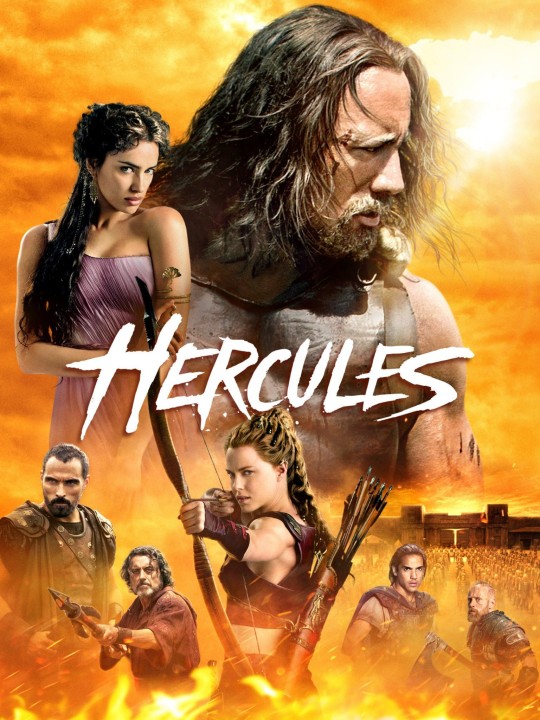
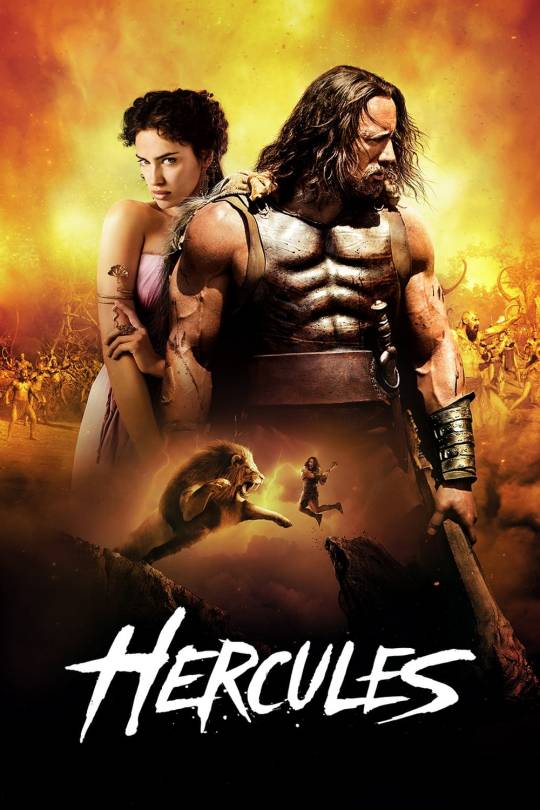
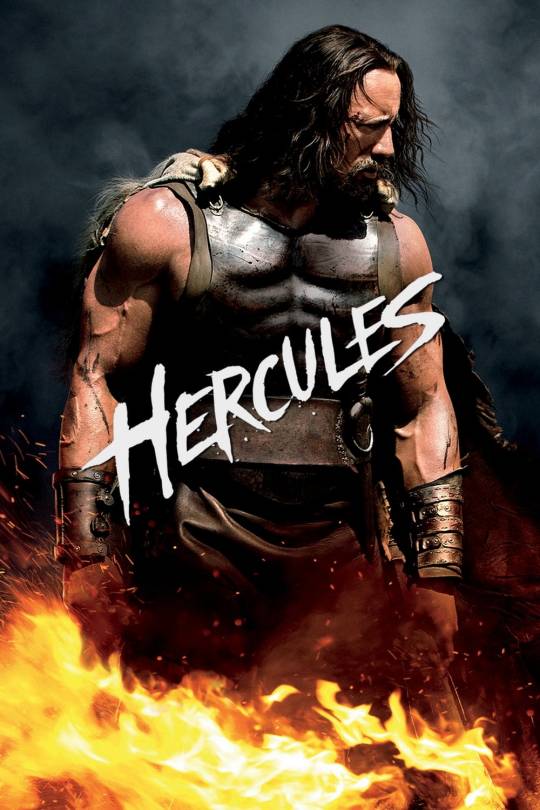
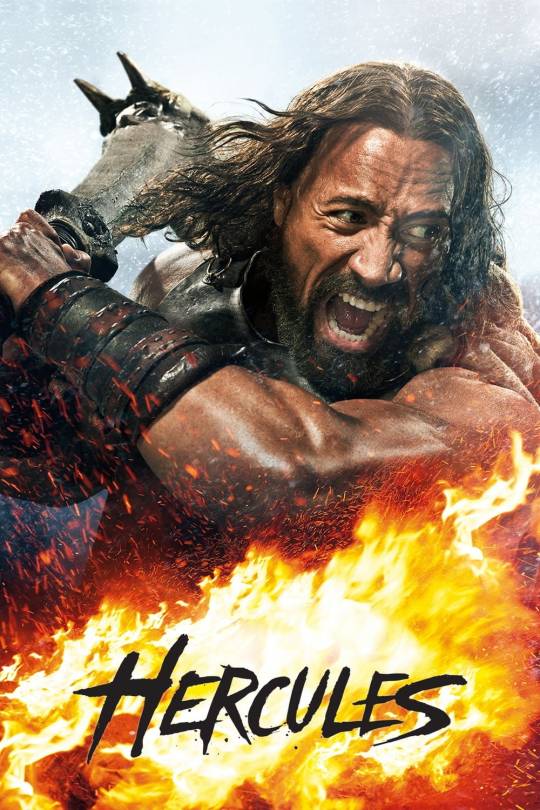
W A T C H I N G
#HERCULES (2014)#DWAYNE JOHNSON#IAN McSHANE#RUFUS SEWELL#JOSEPH FIENNES#REBECCA FERGUSON#Peter Mullan#Reece Ritchie#JOHN HURT#Tobias Santelmann#Irina Shayk#Aksel Hennie#Ingrid Bolsø Berdal#Brett Ratner#action adventure#fantasy#greek mythology#DEMIGOD#Hercules#Amphiaraus#Autolycus#Tydeus#Atalanta#Iolaus#WATCHING
4 notes
·
View notes
Text









Theban Cycle : Amphiaraus
1 note
·
View note
Text

oh wow that comic really took off
#i wasn't expecting that#it's not that i think it's a bad comic or anything; im pretty happy with how it turned out#BUT comics tend to move slower than illustrations and also it's not a particularly popular piece of work i was adapting#that said. i am a little annoyed. by the greek mythology enjoyers and hellenists. tagging apollo and ares and not the actual#main character of the comic amphiaraus. which is also a case of do whatever you want with your blog but also HSHSHRUGHSHDHG#me repeating to myself that you cannot control how people receive your work once you post it vs me gesturing at the A/N
4 notes
·
View notes
Text
















I have fully reworked and redesigned my Apollo timeline!! These designs are meant to depict Apollo from 2591 B.C.E all the way to 392 C.E., so a good 2,983 years of life lol. A lot of things have changed from my first and second versions of this timeline (which you can see here and here if you're interested) so I'm just gonna rewrite the whole things here for y'all to read and enjoy! (Also disclaimer as always I am not a mythology expert, and I am taking some liberties with dates and time periods so sorry if anything seems off!)
Baby: 2591 B.C.E
Apollo is born. That's pretty much all that happens here.
Fighting Python/Exile: 2591-2582 B.C.E.
Right after being born, Apollo goes off to fight Python. After this, he is exiled from Olympus for nine years due to his crime of committing murder. During those nine years, he spends most of his time as either a shepherd or a traveling musician, and observes mortals and their ways of life a lot.
Pre-First Punishment: 2582-2300 B.C.E.
After his exile, Apollo is allowed to ascend to Olympus. He takes on a form that is extremely similar to the mortals he's been living amongst for the past nine years. As the youngest member of the Olympian Council, Apollo is slightly naive, but desperate to prove himself to the rest of his family.
Myths that occur during this time:
1. Apollo finds and mentors Chiron
2. Artemis and Apollo successfully convince their father to release Prometheus from his punishment.
3. Periphas, a king of Attica and priest of Apollo, was so beloved by his people that they honored him above Zeus. This angered Zeus, and he sword he would strike Periphas down and burn his home to the ground. However, Apollo begged Zeus to spare Periphas' life, and Zeus acquiesced. Instead, Zeus turned Periphas into an eagle, the same eagle that now rests on the top of his sacred sceptre.
Post-First Punishment (Troy): 2300-1250 B.C.E.
Back from his time as a mortal, Apollo is now the patron god of the city of Troy. He is extremely attached to his people, and has taken on a lot of their fashions and customs. He is a bit more reserved on Olympus because of the punishment, but he is still young and sure of himself, and is often one of the most active gods on the council.
Myths that occur during this time:
1. Hermes is born.
2. The music duel with Marsyas occurs, and he is flayn.
3. Lots of cities are founded on the west coast of Ionia (Modern day Türkiye), many with myths surrounding Apollo. The city of Miletus was founded and named after a son of Apollo. Klazomenai claimed Apollo as their principal god. The city of Colophon becomes the seat of the Oracle of Apollo Clarius, and one of his sons, named Mopsus, lives there. Erythraea is also connected to Apollo's oracle, as it is the birthplace of Herophile. Once you add Troy to the mix, it seems as if Apollo just did a tour of Ionia and set up a bunch of towns along the way, which I think is pretty cool.
4. The seven against Thebes make their march to restore Polynices, Oedipus' son, to the throne. One of the seven, Amphiaraus, was a seer and favored by Apollo (and sometimes his son!). Amphiaraus was fated to die in battle, but Apollo found multiple ways to stretch out his final moments. He redirected attacks so that Amphiaraus was not harmed, and when the man's charioteer was killed, Apollo took the reins himself. When Amphiaraus finally passed on, Apollo wept over his corpse and let him be consumed by the earth, creating an Oracle at that spot.
Asclepius: 1250-1210 B.C.E.
Asclepius is born and Apollo keeps the same look throughout his entire life! Apollo doesn't have much to do with it, but the Argonauts set sail during this time.
Stealing the bolt/Killing the Cyclops: 1210 B.C.E.
This design only lasts a couple of weeks. In his grief, Apollo loses himself.
Second Punishment 1210 B.C.E
Apollo is given to Admetus as a servant for several months. The punishment doesn't last long, but Apollo's time with Admetus is essential in his journey to heal from Asclepius' death.
Trojan War: 1194-1184 B.C.E.
The Trojan War breaks out less than 20 years after Asclepius' death, bringing ruins and carnage with it. Apollo fulfills his duty as the patron god of the city, and viciously protects Troy from the attacks of other Olympians.
Post-Trojan: 1184-940 B.C.E.
The war was lost, and Troy was sacked. In the time following this, Apollo distances himself from mortals, desperate to escape the pain and grief of the last 70 years. This period of his life ends with the myth of Daphne.
Myths that occur during this time:
1. Dionysus is born
2. Apollo saves Hemithea and her sister Parthenos and makes them immortal.
3. Apollo's oldest known temple is built in Thebes.
Daphne and Hyacinthus 940-776 B.C.E.
After the death of Daphne, Apollo is devastated. While he had been avoiding the mortal realm before, now he became increasingly uncomfortable on Olympus. He stayed in the mortal realm often, building up his reputation and setting up his popularity in Ancient Greece proper, which was just breaking out of the Dark Ages. Near the end of this period, he loves and loses Hyacinthus.
Myths that occur during this time:
1. The cult of Apollo from Crete brings his worship to Delphi officially, and his temple is built at the site.
2. Apollo's music duel with Pan occurs.
“Main” Apollo 776-500 B.C.E.
Starting with the first Olympic games, This period is defined by glory and worship. Apollo's popularity in Greece increases exponentially, and this is only added to once he takes the reins of the sun chariot. He meddles in mortal affairs often during this time, growing into the persona we see of him today.
Myths that occur during this time:
1. Niobe's kids are killed
2. Apollo falls in love with Cyrene, and gives her a city.
3. Tarquin purchases the Sibylline books. Sometime before this, Apollo curses the Sibyl of Cumae.
4. The Pythagorean cult is established, a group that religiously followed the teachings of Pythagoras. Alongside this, they mainly worshiped Apollo at Delphi. They used math to break down music, and believed "the universe as a whole was composed of harmony and numbers".
5. Phorbas, who is either a savage king of Elis or a giant, preys on travelers on the pilgrimage to Delphi. To put a stop to this, Apollo challenges the man to a boxing match, and kills him during the fight. Another Phorbas, this one hailing from Rhodes, is often confounded with this one. Apollo dated the second Phorbas, so I bet this was very confusing for a lot of poor Greeks.
6. The city of Megara fought for independence from Corinth, and claimed Apollo as their patron god.
"Classical" Apollo 500-300 B.C.E.
As Ancient Greece moves into it's classical age, and the height of it's glory, Apollo's worship continues to grow. In the 400's, Pericles and the architects of the Acropolis in Athens used the money held by the Delian league (An allied group of islands in the Cyclades, lead by Delos) to create their temple to Athena, which held the Athena Parthenos. This, alongside many other ways in which Athens attempted to take control of the rest of Greece, caused tension in both the mortal world and Olympus. Apollo begins to see cracks in the foundations of Greece, but can not do much about it at the time.
Myths that occur during this time:
1. The Peloponnesian war breaks out. It lasts 27 years, with Sparta claiming victory over Athens in the end. Olympus continues to degrade as Athena and Ares spar.
2. Shortly after this, the Theban War starts. Sparta had won the Peloponnesian war and taken Athens place as the head of Ancient Greece, but many city-states took issue with this. Both Corinth and Thebes waged war against Sparta, with Thebes being victorious in this struggle. Thebes was Dionysus' city, and Corinth, Poseidon's. The Olympian council continues to splinter.
3. Apollo's first temple in Rome is built. The Temple of Apollo Medicus was constructed outside of the religious boundary in Rome, as Apollo was still seen as a foreign deity at this time, and so his worship was not permitted in the city proper.
Late Greece (300-146 B.C.E)
Greece is falling apart at the seams, with civil wars breaking out all over the region. Rome is growing stronger to the west, and eventually takes over Greece completely at the end of this period. Apollo attempts to ignore the signs of failure, keeping up a relaxed, even as the war begins to devour Greece entirely.
Myths that occur during this time:
1. Dionysus journeys to India
2. Trophonius and Agamethus are killed.
Fall of Greece: 146-32 B.C.E.
Olympus falls, and will not come back together for a while yet. With each deity lost and unfocused, they all have to find their own way back to their former glory. Apollo is one of the last to return to the council, spending centuries wandering the ruins of Greece, burying his people and mourning the culture that had been lost. It is not until Augustus brings his worship to Rome that Apollo returns to Mount Olympus.
Rome 32 B.C.E.- 140 C.E.
Apollo is now one of the chief gods in Rome. Even though he is at the same level of power and popularity that he had during the height of Greece, it doesn't feel the same. Apollo drifts, going through the motions with very little passion behind it. It takes some time for him to warm up to his new civilization, which leads to:
Late Rome 140 C.E.- 392 C.E.
As Rome continues to grow and prosper, Apollo begins to grow fond of it's people. He interacts with them far more, and begins to once again meddle in their affairs, especially when it comes to the various emperors that ruled the nation. This trend continues until the eventual end of pagan worship in Rome.
Myths that occur during this time:
1. Apollo meets, falls in love with, and eventually kills Commodus.
2. The Bacchanalia, which was a private cult festival of the Dionysian cult of Liber that was full of drinking and mingling of all social classes, becomes popular. This festival is obviously associated with Bacchus first and foremost, but there was a common rumour amongst members of the cult that you could meet Apollo at these celebrations.
And that's the whole thing! Hope you all enjoyed, this took a lot of time and research lol.
#trials of apollo#toa apollo#lester papadopoulos#apollart#sunny speaks#long post#timeline#greek mythology
209 notes
·
View notes
Text
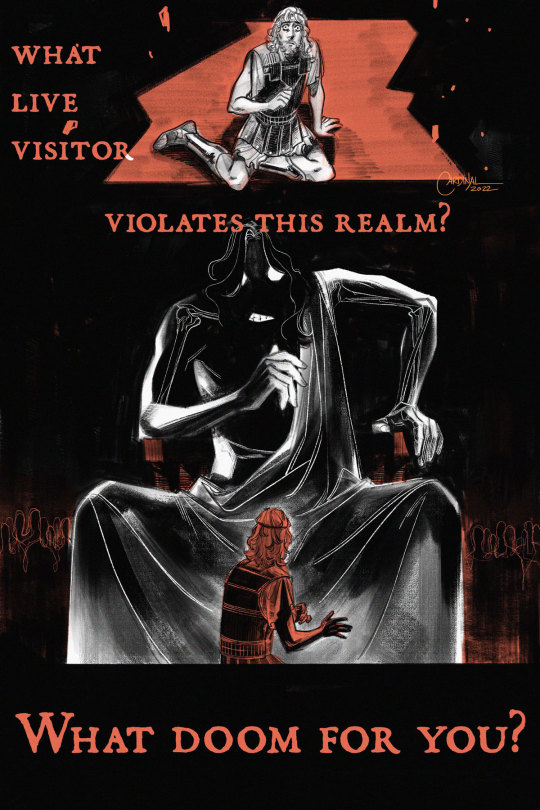
AMPHIARAUS ENTERS THE UNDERWORLD
adapted from the opening scene of chapter VIII of Statius' Thebaid
man its like. kind of horrifying (fun) how Apollo begs a favor from Ares to grant Amphiaraus glory on the battlefield because he's incapable of sparing Amphiaraus from death, but in doing so Amphiaraus stops behaving like Amphiaraus, you are given a "gift" at the expense of yourself, and he's aware of what Apollo is doing! "How much longer are we going to drag this out?" he says
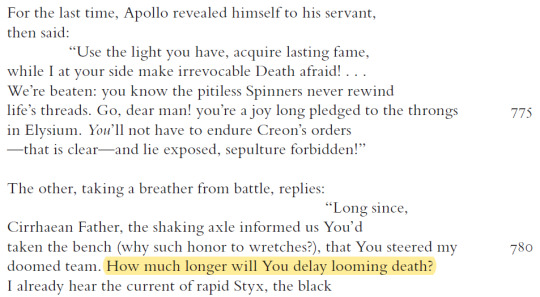
before asking for a favor himself, before the earth splits open and he falls into the underworld, because Apollo can't spare him death, but he does spare him the act of dying, and maybe it's a mercy because there's a moratorium on burials! maybe it's just one more horrifying thing that's done to him because he's Wrong in the underworld, and his presence there brings the cosmic itself into this war. Everyone is brought into this awful theater of family curses!!!!! There Is No Place Spared From The Stain And Gore Of This Crime!!!!
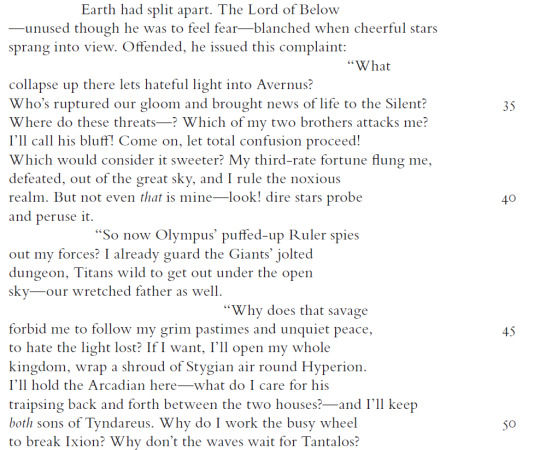


Statius' Thebaid Ch. VIII, trans. Jane Wilson Joyce



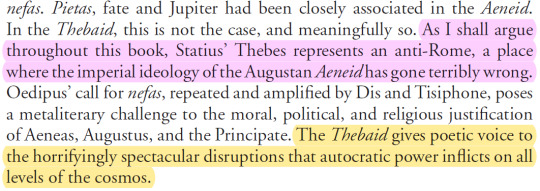
Statius and Virgil: The Thebaid and the Reinterpretation of the Aeneid, Randall T. Ganiban
society6 | ko-fi | redbubble | twitter (pillowfort) | deviantart
#long post#the thebaid#once again!!!! i am standing on a table banging pots and pans together!!! please read the thebaid!!!!! its so good!! ITS SO GOOD#amphiaraus#drawing tag#it's all greek to me#it’s all greek to me
194 notes
·
View notes
Text
in jane wilson joyce's thebaid translation, each book is preceded by an individual introduction to its themes, and i prefer to save them so i can go back and read them after i've completed each book for that maximum brain buzz:
Book VIII falls into two roughly equal halves, pairing Amphiaraus, the least eager of the seven Argive champions, and Tydeus, the least reluctant; the former arrives in the land of the dead before his death, while the latter is predeceased by his honor. [...] What binds the two halves of the book and its disparate elements together is our awareness of the accelerating degeneration of the heroic.
[...]
Grim though the scene is of Tydeus gloating over his enemy’s freshly severed head, it is still within the bounds of heroic revenge—just. But Tydeus’ rage moves from acceptable to demonic, and it does so before the Fury intervenes. As he gazes at Melanippus, he “perceived himself”, but, instead of recognizing their shared mortality and moving from that recognition to heroic respect for a fallen enemy, or even to heroic vaunting, Tydeus grows “bloated” (Lat. gliscit)—he swells with rage, as Tisiphonê was “bloated with pus” (Lat. sanie gliscit—1.107). Left to himself, Tydeus would have stopped there, but his rage, growing out of his identification with Polynices, has set him on a path to total, irredeemable Thebanization.
#REVOLVING IN MY MIND#sorry your boy got IRREDEEMABLY THEBANIZED#due to fucking-- i mean *identifying with* polynices#the thebaid#first impressions tag#tydeus#amphiaraus#melanippus
7 notes
·
View notes
Text
I SAID I WAS GONNA POST DIOSTHE HEADCANONS SO HERE I AM HELLO
anyways ive deduced most of this information via wiki-digging and trying to do research on the Epigonoi (which is unfortunately kinda hard bc its a lost epic! thats right. these guys were first featured in a story we only have like. the first five lines of.) and also the Seven Against Thebes (which i unfortunately have not read entirely) so perhaps not ALL of my personal headcanons are entirely accurate but that is why they are. headcanons. or maybe this is more of a little essay ab what i think their lives were like together. who knows!
It's heavily implied that Diomedes and Sthenelus have known each other at least since Diomedes was young - Sthenelus's exact age in the Epigonoi and the Iliad is never confirmed afaik, and we only have a rough outline of how old Diomedes was during this time. He's believed to be around 14-15 years old when the second Theban siege takes place (lil guy...) and it's stated in the Iliad that he's the youngest of the Achaean kings. He's likely only about 19 or 20 by the time the beginning of the Trojan war rolls around. This guy is baby but he's got a lot of battle experience under his belt.
I think it's pretty safe to say Sthenelus is older than Diomedes - he could be a little or a lot older - but i think Sthenelus is only 2-3 years older than Diomedes. They're close in age, they grew up together, suffered the loss of their fathers together, prepared for a war together. They are stated in many sources as being very close.
I think it's important to talk about their fathers, as it's a very important character beat for the both of them that they succeeded where their fathers failed, and thus they are better than them. So if you don't know about their deaths in the Seven Against Thebes, I'll summarize them here:
Tydeus (Dio's father) was a favorite of Athena. During the first attempt to take Thebes, he was mortally wounded by a guy named Melanippus. Athena was going to make Tydeus immortal - but Tydeus was convinced by Amphiaraus (another one of the Seven, a seer, who hated Tydeus) to eat Melanippus' brain. Athena was appalled by this and instead let Tydeus succumb to his wounds.
Capaneus, on the other hand, was struck down and killed by a lightning bolt thrown by Zeus while he attempted to scale the Theban wall, shouting that not even the gods could stop him. His wife Evadne, overcome with grief by the death of her husband, threw herself on his funeral pyre and died. (Going into more headcanon territory here,) Sthenelus watched as this unfolded, and obviously distraught he furiously grabbed for his mother's skirts, which caught fire and burned his hands.
Sthenelus was orphaned by this event, though he was likely raised by one of his uncles or one of the other older Epigonoi.
Athena (thoroughly disgusted by Tydeus' act of cannibalism) thought to try again with little Diomedes, who was only about 4 years old at the time - he would be a better warrior than his father ever was, and worthy of her gift of immortality eventually - she had big plans for him, and tried to raise him as her own. (Though admittedly, she was not a very good motherly figure at all, and was kind of terrible at this.)
Ultimately all but one of the Seven perished trying to take Thebes. The Epigonoi is the story of their sons who succeeded in taking the city, but the entire epic (except the first five lines) has been lost to time so we don't know exactly how it went. Diomedes and Sthenelus would've been teenagers at the time, and war isn't good for anyone, but it's especially bad for these little guys! They end up becoming very close to cope, they're the youngest Epigonoi, so they stick together. Diomedes appoints Sthenelus as his charioteer so they can be with each other during battle.
Sthenelus ends up developing a huge angsty crush on Diomedes during this time - Sthenelus fell first, and Diomedes fell harder (but not until many years later.) So for a long while Sthenelus is loudly pining and it's all going over Diomedes' head.
But fast forward a bit. The Second Theban War is over, and Diomedes and Sthenelus get married and ascend to the throne as soon as they get back. They rule the two halves of Argos together, and they make a good team, bringing wealth and stability to the city. Diomedes marries Aegialia. Sthenelus' wife is never given a name, but he has two sons with her. Which is quite the weird bit, because Aegialia ends up having an affair with one of Sthenelus' sons while they're off fighting the Trojan War (but I'll get to that.) Neither of them are very stoked about being married and Sthenelus has no idea how to be a father because he's like 17, and it doesn't really matter anyways because they go to battle again. and then again after that. for ten years. all they know is battle and being in survival mode but they have each other.
Until they don't. Diomedes goes off to catch Achilles with Odysseus, while Sthenelus stays in Argos to gather their men for the coming war. They do miss each other lots, but at least Diomedes has some companionship with Odysseus (even if Ody talks his ear off with stories about his wife and son.) They make a good team as Athena's little silly guys!!
Except Sthenelus hates Odysseus. He doesn't like that Diomedes has another best friend and that's really the only reason why, besides the fact that Sthenelus just kinda hates everyone who isn't Diomedes. Anyways Odysseus can totally see this jealousy and like the little shit he is, he's deadset determined to get Sthenelus to like him, because obviously the solution to any triangle such as this is polyamory. win!
(OdySthe is a totally different can of worms i'm not going to open in this post, but now i've put it in your brain.)
So the events of Iliad happen. Agamemnon tries to slander Diomedes and Sthenelus defends him like the hypeman boyfriend he is but Diomedes tells him to shut up. And then he gets yeeted off his own chariot by Athena. Diomedes proclaims that even if everyone leaves, he and Sthenelus will take Troy together. And all the while Sthenelus is pining for Diomedes and Diomedes doesn't really notice but is totally pining back (and Odysseus who actually has a somewhat healthy image of love and romance is like, these guys have GOT to kiss. for their health. but they wont.)
And they don't! Ten years of war go by and Sthenelus is convinced he's just going to pine forever, but it's fine, because it's enough just to be in Diomedes' company. They could never be together anyways. The Trojan War comes to an end and everyone goes their separate ways. Diomedes sails back to Argos with Sthenelus, but Aegialia and Sthenelus' son Cometes prevent them from entering the city.
Diomedes asks if Sthenelus will travel to Italy with him. They're weary from their journey, and can't enter their home, and with all the tension Diomedes isn't sure Sthenelus will say yes to him this time. They've been through so much - has he finally had enough?
But of course Sthenelus says yes, and this is the epiphany moment for Diomedes, that he's actually loved Sthenelus for so many years but just never realized it. And there's definitely a big love confession from both of them, and they definitely finally kiss (Odysseus would be so proud) but it's really short-lived bc they gotta get the fuck outta dodge.
They go to Italy. There's lots of different accounts as to what Diomedes does there (besides founding a bunch of cities) and in some cases he doesn't go to Italy at all, but it's generally accepted that he founded cities in Italy and never went to battle again. It's never mentioned that Sthenelus goes with him either, but I like to think they don't have to part ways. It's hard for them because all they've ever known is war, but they settle into peace together.
i am admittedly not very good at ending things but!! if you read my ramblings this far i applaud you. this post honestly could have gone on so much longer and it definitely will not be the last one i make about them lmao
#they honestly have so much potential as a pairing and NO ONE TALKS ABOUT THEM so i will do it <3#the slowest slow burn there ever was#like 15 years in the making purely because dio just does not have the brain space to think about a committed relationship#but its alright sthe can wait for him <3#but anyways..... i post about odysthe when. i need you to see my rarepair#this post took me like two hours to write and i got all my sources in my tabs#diomedes#sthenelus#diosthe
26 notes
·
View notes
Text

He hates everything
3 notes
·
View notes
Text
Thinking about the Argo's journey again and who's going etc... (this is using my own headcanon for characters' ages):
Laertes - I am not taking my ~sixteen year old son with me, besides, this will be a good learning experience for him.
Tyndareos - Oh, sure, I'll let my twin sixteen year olds go off to Iolkos and then on a journey of uncertain length and danger without me. :) There are other adults there that can look after them - and one of my sons is a son of Zeus, it's fine.
Caeneus - (Has at least one, maybe two sons with him, somewhere in the older teenager-twenty year old range) Family outing! :D
Telamon - Even if I could fetch my son easily from Chiron given we're relatively close, he stays there. (*there's not really any source that has Ajax training with Chiron as far as I can remember, but it makes sense so why not.)
Other things of note; is Herakles glaring daggers at Augeas on the other side of the gathering/ship until he's left behind?
Do the Dioskouroi and the Apharetidai get along, still, or do they already have beef? (Grown men having issue with teenagers though...)
Tydeus and Amphiaraus having a fun little vacation before the attack on Thebes in a couple years...
19 notes
·
View notes
Text
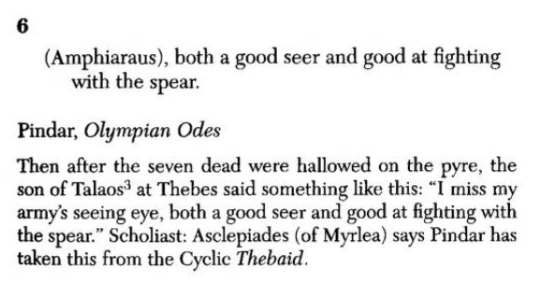
Epic fragments thebaid 6
#adrastos#adrastus#amphiaraus#amphiaraos#greek mythology#tagamemnon#ancient greece#the thebaid#he killed his father and he say smth like this
3 notes
·
View notes